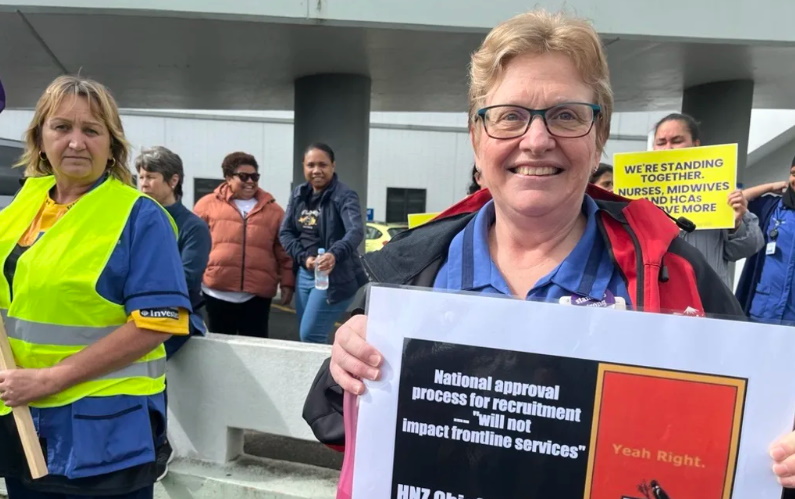Top Stories
Assaults on Healthcare Workers Surge 30% in Two Years

Reports indicate a troubling trend in the healthcare sector, with assaults on hospital workers in New Zealand increasing by 30% over the past two years. According to data obtained by RNZ, 7,777 assaults on Health NZ hospital staff were documented in the 12 months leading up to June 2024, compared to 6,635 assaults in the previous year. Concerns have been raised by frontline workers regarding the underreporting of these incidents, suggesting that the actual numbers could be significantly higher.
The New Zealand Nurses Organisation delegate, Tracy Chisholm, who works at Waikato Hospital, highlighted the challenges of reporting assaults. “Finding the time to report an assault is a challenge,” she said, noting that emergency department nurses frequently endure verbal abuse. “If you multiply that by 120 nurses every week, it’s almost become an accepted part of our workplace.”
The figures indicate that assaults on healthcare staff could also occur outside hospital grounds. For instance, a worker from Palmerston North Hospital was recently threatened at gunpoint while getting into their car after a shift. At Waikato Hospital alone, more than 340 assaults were reported in the last year, a notable increase from around 260 two years ago.
Chisholm emphasized that while security measures exist, the actual feeling of safety can vary based on the circumstances. “ED is lucky. We technically have security 24-7, but when we have those patients that provide a threatening environment for us, it will depend on who’s around us for how safe we feel,” she explained. Many hospital staff have called for enhanced powers for security officers to better manage violent situations.
The root causes of these assaults are complex, often stemming from patients’ frustrations over lengthy wait times. Chisholm pointed out that a 12-hour wait in an emergency department can lead to heightened agitation. “If you’re lucky, you might see a nurse, and that can make people really grumpy. That comes out on the nurses,” she noted.
The executive director of the Association of Salaried Medical Professionals, Sarah Dalton, echoed these sentiments. She underscored that patients’ frustrations often arise from an inability to access timely care, compounded by a lack of adequately resourced waiting areas for individuals with behavioral issues. “Most of our hospitals lack safe waiting or treatment facilities for those people,” she stated.
The rise in violence has prompted serious concern from various stakeholders. Malcolm Mulholland from Patient Voice Aotearoa expressed anxiety over the potential for severe injuries or fatalities among healthcare staff due to escalating assaults. “It’s a huge number, and I just hope that we don’t see the day where we pick up a paper and read that a hospital worker has suffered a very severe injury or – worse – death due to an assault committed in a hospital setting,” he said.
In response to the increasing violence, Health NZ has taken steps to bolster security measures. Interim chief human resources officer Robyn Shearer stated that the organization has invested $31 million to enhance security in emergency departments over the past two years. Additional resources include 44 new security officers assigned to larger hospitals, and training for more than 1,600 staff members has amounted to 20,000 hours focused on violence reduction.
Shearer acknowledged that societal factors contribute to the challenges faced by healthcare workers, including staffing pressures within the system. “The healthcare system, like many other services, is impacted by wider societal trends, pressures, and changes,” she explained.
While there is a push for security officers to have greater powers, Shearer indicated that such changes would require legislative action. “The important thing is that we still have to deliver our good-quality healthcare to people who may be quite distressed,” she said. Staff members are encouraged to report incidents of assault, and Health NZ has mechanisms in place to address these concerns at various levels of the organization.
As healthcare workers continue to face these alarming trends, the need for systemic changes to improve safety and care access becomes increasingly pressing.
-

 World3 months ago
World3 months agoTest Your Knowledge: Take the Herald’s Afternoon Quiz Today
-

 Sports3 months ago
Sports3 months agoPM Faces Backlash from Fans During Netball Trophy Ceremony
-

 Lifestyle3 months ago
Lifestyle3 months agoDunedin Designers Win Top Award at Hokonui Fashion Event
-

 Sports3 months ago
Sports3 months agoLiam Lawson Launches New Era for Racing Bulls with Strong Start
-

 Lifestyle3 months ago
Lifestyle3 months agoDisney Fan Reveals Dress Code Tips for Park Visitors
-

 World4 months ago
World4 months agoCoalition Forms to Preserve Māori Wards in Hawke’s Bay
-

 Health3 months ago
Health3 months agoWalking Faster Offers Major Health Benefits for Older Adults
-

 Politics3 months ago
Politics3 months agoScots Rally with Humor and Music to Protest Trump’s Visit
-

 Top Stories4 months ago
Top Stories4 months agoUK and India Finalize Trade Deal to Boost Economic Ties
-

 Entertainment3 months ago
Entertainment3 months agoExperience the Excitement of ‘Chief of War’ in Oʻahu
-

 World4 months ago
World4 months agoHuntly Begins Water Pipe Flushing to Resolve Brown Water Issue
-

 Science4 months ago
Science4 months agoNew Interactive Map Reveals Wairarapa Valley’s Geological Secrets









